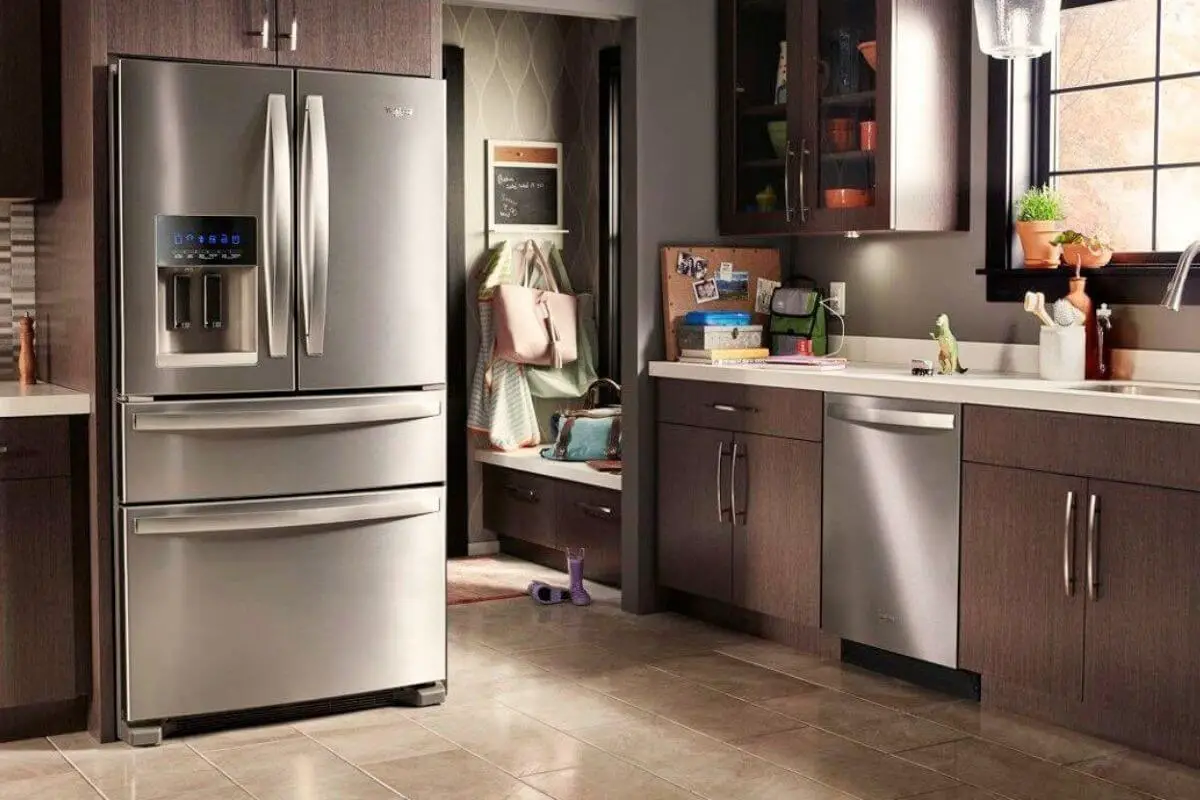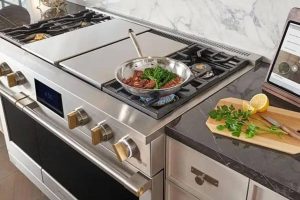When it comes to equipping your kitchen with top-quality appliances, two prominent names that often come up are LG and Whirlpool. These brands have built a solid reputation for producing a wide range of kitchen appliances designed to enhance your culinary experience. In this article, we’ll dive into the world of LG vs. Whirlpool kitchen appliances, exploring the differences and similarities between these brands to help you make an informed decision for your kitchen.
A Brief Introduction to LG
LG, a prominent South Korean brand, has made a significant mark in the world of kitchen appliances. Known for its innovation and advanced technology, LG offers a comprehensive range of kitchen appliances that cater to a variety of needs. Whether it’s refrigerators, ovens, dishwashers, microwaves, or other kitchen essentials, LG appliances are celebrated for their sleek, modern designs and the integration of cutting-edge features and smart technology. This combination of style and functionality has established LG as a go-to choice for those seeking contemporary and high-tech solutions for their kitchens.
A Brief Introduction to Whirlpool
Whirlpool, an enduring American brand, boasts a rich history in the world of kitchen appliances. With a legacy of reliability and durability, Whirlpool offers a diverse array of kitchen appliances. These products are known for their ability to stand the test of time, making them a trusted choice for households. Whirlpool appliances come in a variety of styles, ranging from classic and timeless designs to more contemporary options, ensuring that there’s a Whirlpool appliance to fit various kitchen aesthetics. This versatility and reputation for dependability make Whirlpool a popular choice among those who value resilience and a wide range of design options for their kitchen.
LG vs. Whirlpool: A Head-to-Head Comparison
Now, let’s delve into a head-to-head comparison between LG and Whirlpool to provide you with a comprehensive understanding of how these two brands stack up against each other. This analysis will help you make an informed decision when choosing between LG and Whirlpool for your kitchen appliances.
Design and Style
LG: LG kitchen appliances often feature a modern and minimalist design, characterized by sleek lines and stainless steel finishes. They are designed to seamlessly blend into contemporary kitchen settings, adding a touch of sophistication.
Whirlpool: Whirlpool appliances cater to a broader range of design preferences. They offer classic and timeless designs as well as more contemporary options. This versatility means you can find a Whirlpool appliance that complements your kitchen’s specific style.
Innovation and Technology
LG: LG is at the forefront of incorporating technology into kitchen appliances. Many LG products feature smart technology, such as Wi-Fi connectivity and compatibility with virtual assistants like Alexa and Google Assistant. This allows you to control and monitor your appliances remotely.
Whirlpool: While Whirlpool also embraces technological advancements, their focus is often on enhancing the functionality and reliability of their appliances. They offer features like adaptive defrost and adaptive cooking technology to optimize performance.
Durability and Reliability
The durability and reliability of kitchen appliances are vital considerations when making your selection. These factors ensure that your investment in appliances pays off in the long run and that your kitchen operates smoothly. Here’s why durability and reliability are crucial:
Durability:
- Durable appliances are built to withstand the rigors of daily use. They should be made from high-quality materials that can handle wear and tear over the years.
- Consider the construction of appliances. Stainless steel and cast iron are materials known for their durability, often used in appliances like ovens and cooktops.
- Look for appliances with a solid build, as they are less likely to develop issues or require frequent repairs.
Reliability:
- Reliable appliances consistently perform their intended functions without hiccups. They should be able to handle tasks like cooking, refrigeration, or dishwashing efficiently.
- Research the reputation of the brand and specific models you’re considering. Reliable brands are known for producing appliances that stand the test of time.
- Reliable appliances often come with warranties that demonstrate the manufacturer’s confidence in their products.
Longevity:
- Longevity is a key aspect of durability and reliability. The longer an appliance can operate without issues, the more value it provides for your investment.
- Read user reviews and expert opinions to gauge the longevity of appliances. Real-world experiences from other users can provide insights into an appliance’s durability and reliability.
Maintenance:
- Consider the maintenance requirements of appliances. Some may need more frequent cleaning or servicing to maintain their functionality.
- Appliances with self-cleaning features or low-maintenance components can save you time and effort in the long term.
Warranty and Customer Support:
- The warranty provided by the manufacturer is an indicator of their confidence in the appliance’s durability and reliability. Ensure you understand the terms of the warranty.
- Consider the availability of customer support. A responsive and efficient customer support team can address any issues or questions you may have during the appliance’s lifespan.
In summary, durability and reliability ensure that your kitchen appliances serve you well for many years, reducing the need for frequent replacements or repairs. When selecting appliances, it’s essential to invest in those that are built to last and consistently perform their intended functions, adding value to your kitchen and daily life.
Pricing
LG: LG appliances tend to be in the mid to high price range. While you get advanced features and technology, this can impact the overall cost.
Whirlpool: Whirlpool offers a more extensive range of price points, making it easier to find an appliance that fits your budget without sacrificing quality.
Pricing is a critical factor when choosing kitchen appliances, as it directly impacts your budget and the overall cost of outfitting your kitchen. Here’s why pricing is important and how to approach it:
Setting a Budget:
- Begin by establishing a realistic budget for your kitchen appliances. Determine the total amount you’re willing to spend on appliances, and then allocate specific amounts for each appliance category (e.g., refrigerators, stoves, dishwashers).
Prioritizing Essential Appliances:
- Prioritize essential appliances that you absolutely need. Items like refrigerators, stoves, and dishwashers are fundamental to a functional kitchen.
Balancing Features and Cost:
- Consider which features are essential for your needs and which are nice-to-have but not crucial. High-end appliances with advanced features can be costly, so balance your requirements with your budget.
Energy Efficiency and Long-Term Savings:
- While energy-efficient appliances may have a higher upfront cost, they can lead to long-term savings on utility bills. Look for appliances with the ENERGY STAR label, indicating that they meet or exceed energy efficiency standards.
Exploring Financing Options:
- Some appliance retailers offer financing options or packages for buying multiple appliances. These financing options can help you manage your budget more effectively and afford the appliances you desire.
Sales and Promotions:
- Keep an eye out for seasonal sales, holiday promotions, and clearance events. These can provide opportunities to purchase high-quality appliances at a reduced price, helping you stay within your budget.

Used or Refurbished Appliances:
- If you’re working with a tight budget, don’t overlook the possibility of purchasing gently used or refurbished appliances. Many of these appliances are still in excellent working condition and can save you a significant amount.
Installation and Delivery Costs:
- Remember to account for installation and delivery costs when budgeting. These expenses can add up, especially for large appliances that require professional installation.
Maintenance and Repair Budget:
- Consider setting aside a portion of your budget for potential maintenance and repairs. This reserve can help cover unexpected costs that may arise in the future.
Safety and Quality:
- Even when on a budget, it’s essential not to compromise on safety and quality. Ensure that the appliances you choose meet safety standards and are built to last.
By carefully managing your budget and exploring your options, you can select kitchen appliances that meet your needs without exceeding your financial limits. Balancing your budget with the features and quality you require ensures that you can create a well-equipped kitchen without breaking the bank.
Factors to Consider When Choosing Kitchen Appliances
When deciding between LG and Whirlpool kitchen appliances, consider these factors:
When it comes to choosing kitchen appliances, several critical factors should guide your decision. Your kitchen is the heart of your home, and the appliances you select can significantly impact your daily life. Here are the key factors to consider:
Kitchen Layout and Size:
Your kitchen’s layout and size are fundamental considerations when choosing kitchen appliances. The layout, or the way your kitchen is organized, can greatly influence the types and sizes of appliances that will best fit. Here’s why this is important:
Kitchen Layout:
- Open Layout: In open-concept kitchens, appliances may be more visible from other parts of your home. You may want to prioritize appliances with sleek designs and finishes that match your overall home decor.
- Galley Kitchen: In a narrow galley kitchen, space is often limited. Consider space-saving and compact appliances to maximize your usable area.
- L-Shaped or U-Shaped Kitchen: These layouts offer more counter space. You can choose larger appliances or add additional ones, such as a double oven or a large refrigerator.
Kitchen Size:
- Small Kitchen: In a compact kitchen, you’ll need to be more selective about the size of your appliances. Look for compact or counter-depth options to save space. Consider built-in or integrated appliances to create a seamless look.
- Large Kitchen: In a spacious kitchen, you have the luxury of fitting larger appliances and can opt for oversized refrigerators, professional-grade stoves, and expansive islands with built-in appliances.
Consider Workflow:
- Think about how you move around the kitchen while cooking. Ensure that appliances are positioned for efficient workflow. The arrangement should make tasks like prepping, cooking, and cleaning as smooth as possible.
Cabinet and Counter Space:
- Consider the placement of cabinets and counters. Appliances like ovens, refrigerators, and dishwashers should be easily accessible and well-integrated into the cabinetry.
Ventilation:
- In some layouts, especially in island kitchens, proper ventilation is crucial. Ensure that your layout allows for efficient and effective ventilation solutions, such as range hoods or downdraft systems.
By carefully assessing your kitchen’s layout and size, you can choose appliances that not only fit comfortably within the space but also enhance its functionality and aesthetics. The right appliances will not only make your cooking experience more convenient but also complement the overall design of your kitchen.
Budget:
When considering your budget for kitchen appliances, it’s essential to strike a balance between quality and cost. Your budget will largely determine the range of options available to you. Here are some key points to keep in mind regarding budget:
Set a Realistic Budget:
Determine the maximum amount you’re willing to spend on each appliance category, such as refrigerators, stoves, dishwashers, and more. Having a clear budget in mind will help you narrow down your choices.
Prioritize Essential Appliances:
Start by allocating a significant portion of your budget to essential appliances like refrigerators and stoves. These are the workhorses of the kitchen and should be of good quality.
Consider Long-Term Savings:
While high-quality, energy-efficient appliances may have a higher upfront cost, they can save you money in the long run by reducing energy consumption and utility bills. Look for appliances with the ENERGY STAR label.
Explore Financing Options:
Some appliance retailers offer financing options or packages for buying multiple appliances. These can help you manage your budget more effectively.
Balance Features and Cost:
Determine which features are essential for your needs. Sometimes, more affordable models without the latest bells and whistles can provide excellent value for your budget.
Consider Used or Refurbished Appliances:
If you’re on a tight budget, don’t overlook the possibility of purchasing gently used or refurbished appliances. Many of these are still in excellent working condition and can save you a significant amount.
Look for Sales and Promotions:
Keep an eye out for seasonal sales, holiday promotions, and clearance events. These can provide opportunities to purchase high-quality appliances at a reduced price.
Plan for Installation and Delivery Costs:
Remember to account for installation and delivery costs in your budget, as these expenses can add up, especially for large appliances.
Allocate for Maintenance and Repairs:
While budgeting, consider setting aside a portion for potential maintenance and repairs. This can help you cover unexpected costs that may arise in the future.
Don’t Compromise on Safety and Quality:
Even if you have budget constraints, it’s essential not to compromise on safety and quality. Ensure that the appliances you choose meet safety standards and are built to last.
By carefully planning and allocating your budget for kitchen appliances, you can make informed decisions that meet your cooking and storage needs without overspending. Remember that the kitchen is a vital part of your home, and investing in quality appliances can enhance your daily life and the functionality of your culinary space.
Energy Efficiency:
Look for appliances with the ENERGY STAR label, which indicates that they meet or exceed energy efficiency standards. Energy-efficient appliances can help you save on utility bills while reducing your environmental footprint.
Appliance Types:
Consider the specific appliances you need for your kitchen. This includes refrigerators, ovens, cooktops, dishwashers, microwaves, and more. Think about the features and capacity that best suit your cooking and storage needs.
Brand and Reputation:
Research and choose well-established brands known for their quality, reliability, and customer service. Brands like LG and Whirlpool have solid reputations in the appliance industry.
Style and Aesthetics:
Select appliances that match your kitchen’s style and design. Whether you prefer modern, traditional, or a mix of styles, your appliances should seamlessly blend in with your decor.
Warranty and Support:
Review the warranty offered by the manufacturer and their customer support. It’s essential to know how the brand will stand by their products if any issues arise.
User Reviews and Ratings:
Check user reviews and ratings to gain insights into real-world performance and customer satisfaction. This can provide valuable information about the appliances’ reliability and usability.
Smart Technology:
Decide whether you want smart appliances with features like Wi-Fi connectivity and compatibility with virtual assistants. Smart appliances can add convenience to your kitchen routine.
Maintenance and Cleaning:
Consider how easy it is to clean and maintain the appliances. Appliances with self-cleaning features can save you time and effort in the long run.
Longevity and Durability:
Look for appliances made from high-quality materials and construction. Durability is crucial, as you want your appliances to last for many years without frequent repairs.
Safety Features:
Check for safety features, especially if you have children. Features like child locks and safety sensors can help prevent accidents.
Customization and Accessories:
Some appliances offer customization options and come with a range of accessories. Explore these options if they align with your preferences.
By carefully considering these factors, you can make informed choices when selecting kitchen appliances that not only meet your cooking and storage needs but also enhance the functionality and aesthetics of your kitchen.
Conclusion
In conclusion, the decision to choose between LG and Whirlpool for your kitchen appliances ultimately comes down to your specific requirements, preferences, and priorities. Both brands have their unique strengths and advantages, making them excellent options in the world of kitchen appliances. Here’s a brief recap of the key points to consider:
- LG stands out for its modern and innovative designs, cutting-edge technology, and smart features. If you prioritize a contemporary look and advanced connectivity, LG might be the brand for you.
- Whirlpool is celebrated for its long-standing reputation for reliability, durability, and versatile design options. If you value dependable performance and a wide range of style choices, Whirlpool could be the perfect fit for your kitchen.
When making your decision, consider your kitchen’s design, your technological preferences, budget constraints, and the level of customer support each brand provides. These elements will guide you toward the appliances that not only match your needs but also elevate the overall functionality and aesthetics of your kitchen.
Remember, the kitchen is the heart of your home, and your choice of appliances can significantly enhance your cooking experience and daily life. By carefully evaluating your needs and preferences, you’ll find the appliances that are the perfect fit for your culinary space.
FAQs
What are the essential kitchen appliances every home should have?
Essential kitchen appliances typically include a refrigerator, stove or cooktop, oven, dishwasher, and microwave. These appliances cover basic food storage, cooking, and cleaning needs.
Are high-end, expensive appliances worth the investment?
High-end appliances often come with advanced features, superior build quality, and extended warranties. If these factors align with your priorities and budget, they can be a worthwhile investment for the long term.
What’s the importance of energy-efficient appliances?
Energy-efficient appliances can help you reduce utility bills and minimize your environmental footprint. They are designed to use less energy, saving you money over time while promoting sustainability.
Is it better to buy all appliances from the same brand or mix and match?
This depends on your preferences and needs. Some homeowners prefer a uniform look and design across all appliances, while others prioritize individual performance. Mixing and matching can be a good option if it better serves your specific requirements.
What’s the average lifespan of kitchen appliances?
The lifespan of kitchen appliances can vary widely depending on factors such as usage, maintenance, and quality. However, with proper care, many appliances can last anywhere from 10 to 20 years.
How can I ensure the safety of kitchen appliances, especially if I have children?
Look for appliances with safety features such as child locks and safety sensors. Store hazardous materials out of reach and teach children about appliance safety. Supervision is crucial, especially for younger children.
What should I do if I encounter problems or defects with my appliances?
If you encounter problems or defects, refer to the manufacturer’s warranty for guidance on repairs or replacements. In many cases, contacting the manufacturer’s customer support is the first step to resolve issues.
Are extended warranties for appliances necessary?
Extended warranties are optional and can provide additional coverage beyond the manufacturer’s warranty. Whether you opt for one depends on your risk tolerance and how long you plan to keep the appliance.
Can I install kitchen appliances myself, or should I hire a professional?
The complexity of installation varies by appliance. While some appliances can be installed by homeowners, others, like gas stoves or built-in ovens, may require professional installation to ensure safety and functionality.
How can I maintain and clean my kitchen appliances to extend their lifespan?
Regular maintenance, such as cleaning, and following the manufacturer’s care instructions are essential for prolonging the lifespan of your appliances. Many appliances also have self-cleaning features to simplify maintenance.
What should I consider when choosing the right refrigerator size for my family?
When choosing a refrigerator size, consider the number of family members, your weekly shopping habits, available kitchen space, and the types of items you typically store in your fridge.
How do I determine the right stove or cooktop size for my kitchen?
The size of your stove or cooktop should be proportional to your kitchen’s available counter space. Consider the number of burners or elements you need for your cooking style and the types of cookware you use.
What are the key factors to consider when selecting a dishwasher?
Key factors for choosing a dishwasher include capacity, noise level, energy efficiency, washing cycles, and features such as adjustable racks and stainless steel interiors.
Are smart kitchen appliances worth the added cost?
Smart appliances can offer added convenience and control. Whether they are worth the cost depends on your interest in remote operation, automation, and integration with smart home systems.
What’s the difference between a convection oven and a conventional oven?
A convection oven has a fan and exhaust system that circulates hot air, resulting in faster, more even cooking. Conventional ovens rely on radiant heat from the heating elements.
How can I ensure my appliances’ safety during a power outage or electrical surge?
Consider using surge protectors and uninterruptible power supplies (UPS) to safeguard your appliances during electrical disturbances. Additionally, unplug sensitive appliances during extended outages.
Can I replace my appliances one at a time, or should I invest in a complete kitchen appliance package?
Replacing appliances one at a time can be more budget-friendly, but a kitchen appliance package can offer cohesive design and possibly cost savings if you’re upgrading all appliances simultaneously.
What are some energy-saving tips for using kitchen appliances?
Energy-saving tips include using the appropriate-sized pots and pans on stovetops, ensuring your refrigerator and freezer doors seal properly, and running dishwashers and washing machines with full loads.
How often should I clean and maintain my kitchen appliances to ensure their longevity?
Regular cleaning and maintenance should be performed according to the manufacturer’s recommendations, but generally, you should clean and inspect appliances at least once a month to prevent dirt and debris buildup.
What should I do with old or replaced kitchen appliances?
Consider recycling or donating old appliances if they are still functional. Many local recycling centers accept appliances. Some appliance retailers also offer recycling services when you purchase new ones.
These FAQs aim to provide you with a deeper understanding of various kitchen appliances and the factors to consider when choosing, maintaining, and using them. Keep these questions in mind to make informed decisions and get the most out of your kitchen appliances.
These FAQs are designed to help you make informed decisions about your kitchen appliances, whether you’re in the market for new ones or looking to maintain your existing equipment. Always consider your specific needs, budget, and kitchen layout when choosing appliances, and don’t hesitate to seek expert guidance when necessary.



